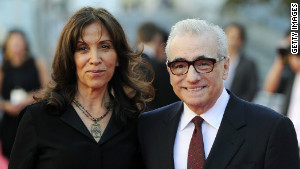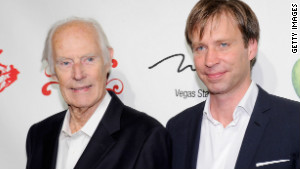|
Oh, he wasn't always so quiet.
Contrary to his
somber popular image -- created in the early days of Beatlemania and never truly put to rest -- George Harrison loved to laugh,
and he loved to make others laugh. After all, this is a man who mortgaged his house so Monty Python could make "Life of Brian"
because he wanted to see it -- "still the most anybody's ever paid for a cinema ticket," jokes Python's Eric Idle.
"He
was a very amusing person," says his widow, Olivia, in a phone interview from Friar Park, the longtime Harrison residence
in Oxfordshire, England. "He was funny, and he made you funny to be around him, and if you could make him laugh, that was
just great."
Of course, he could be quiet. He loved to spend hours working in his gardens. He could be prickly, too --
and thoughtful, and bitter, and expansive, and wistful.
In other words, he was a human being, this Beatle and ex-Beatle
and musician and racing enthusiast. (You didn't know about the auto racing?) As Martin Scorsese's award-winning documentary
on Harrison, "George Harrison: Living in the Material World," revealed, he wasn't easily pigeonholed -- and he liked nothing
more than to take the piss out of all the cliches.
After all, this was a man who gleefully participated in a mockumentary
about the Rutles, a parody Beatles whose characters included a tight trouser-loving manager named Leggy Mountbatten, a movie
called "Yellow Submarine Sandwich" and a spouse identified as "a simple little German girl whose father had invented World
War II." Harrison played a reporter present at the pillaging of the Rutles' business headquarters.
"Material World," which
premiered last fall on HBO (whose parent company also owns CNN) and has been making its way around the world, is being released
on video on May 1. CNN spoke to Olivia Harrison and the documentary's music producer, Giles Martin, son of Beatles producer
Sir George Martin. (Sir George, 86, is "great," says Giles, noting that, having hung it up three years ago, "he's enjoying
early retirement.")

|
| Olivia Harrison praised director Martin Scorsese's work on the documentary. |
The following is an edited
and condensed version of the transcript.
CNN: People
often aren't aware of what a great sense of humor George had. He was thought of as "the quiet Beatle," the "mystical Beatle."
I wonder if either of you have stories about his humor.
Olivia Harrison: He was mischievous. He did like to tease
people a lot. I just got so used to being wound up -- he just wound me up every single day I think I knew him. And he said,
"You're just so easy to wind up." He'd make some really bad remark, and he'd just do it so I'd start protesting. And he was
funny, and he made you funny to be around him, and if you could make him laugh, that was just great.
CNN: And you,
Giles?
Giles Martin: I was a kid [attending] Simon and Garfunkel at Wembley Stadium. I was standing in the urinals,
kind of embarrassed, and he said, "Do you need any help?" He'd seen me with my parents, but I didn't recognize him. ... [Upon
leaving, the stranger started chatting with Giles' parents.] They said, "George, have you met my son Giles?" and he said,
"Yes, we just had a piss next to each other." There was no pomp and circumstance with him. And whenever it came to [recording
at] Abbey Road, there was no red carpet. He wanted everyone to be treated the same.
CNN: What do
you think George would be doing if he hadn't played music? He loved gardening and auto racing.
Harrison: I have
no idea. He always said he had no idea what he would have done if he wasn't a musician. He didn't have a clue. He'd have been
a total failure, he said. He had no idea how to do anything else. I think he would have found something, but I don't think
he was ever meant to be anything else. When you can't do anything else, that's what you are. If you have to paint, you have
to write, you have to do music, that's who you are. You don't have any choice. And he really felt he didn't have any choice.
CNN: So he didn't
see dropping the guitar and becoming a landscape architect.
Harrison: Oh, I think he did. And he did that, too.
But early on in life, if he hadn't been a musician, there wasn't an option to not be one. That's how it was.
CNN: In the
film, you talk about the gardens at Friar Park and how much effort and love he put into them.
Harrison: And it
wasn't just here, it was in general. It's funny: The root of George is "geo," which means "of the earth." And that's -- again
-- that's who he was. He just loved being out in nature.

|
| Giles Martin, right, has followed in the footsteps of his father Sir George, left, the Beatles' prod |
CNN: Giles,
the music for the documentary came from a range of sources. What challenges did you have in producing it?
Martin:
Marty [Scorsese] would want the song, say, "All Things Must Pass," which is a classic track from a classic album, but it's
made for vinyl. And if you played it in the cinema, it wouldn't be the way you remember it sounding. It would sound small.
So you're ripping everything apart and putting it together so it sounds how you think you should remember it. And that's a
challenge, because you have to pay utmost respect to the original creation, and at the same time, you have to rub everyone's
memories the right way.
CNN: Olivia,
did George usually put in a lot of winks and nudges to you when he wrote songs?
Harrison: There were a lot of
songs that I would look back on and go, "Oh yeah." He expressed his emotions in his songs. He didn't really express them so
much in daily life. He saved them up, I think. Sometimes, he was difficult to talk to about certain things, and then he would
write a song, and I'd say, "How can you do that? How can you put your whole thoughts and inner being out there in a song?"
I could never do that. That was just the way he was -- how artists are. They're baring their souls to you. So nudges and winks?
I guess there are a lot of them.
CNN: What has
been the reaction to the film since its release?
Harrison: It's been extraordinary. We went to Mumbai, to the
film festival there, [and] for them, to see footage of George riding around in a rickshaw in India -- not being a tourist,
but participating in daily life there -- they were so happy. It was such a great response. It's been going around the world,
to the Istanbul Film Festival, and it's going to Rome. It's a thoughtful documentary. It evokes something in all of us --
what are we doing? Are we doing OK in our lives? And are we making enough effort? And I think it touches that chord in people.
CNN: I think
the ending is one of the most moving things I've ever witnessed.
Harrison: We tried to end the documentary in
a different way, but Marty tried so many different endings and he said, "No, that's it. That's what happened. That's the end
of a life." I think it's a surprising documentary -- it leads you somewhere you don't expect. You certainly don't expect it
to be as deep. I didn't. I think it's a real tribute to Marty that he managed to capture that
|



